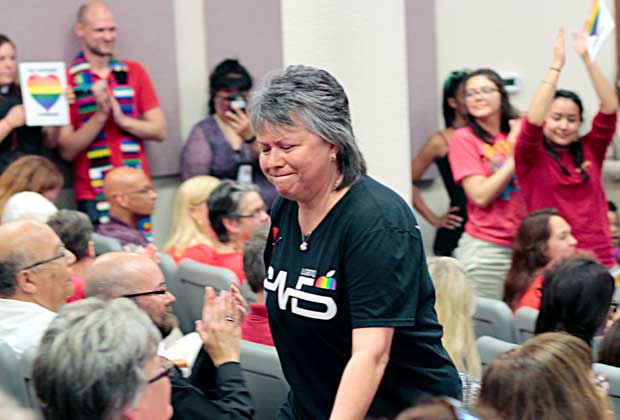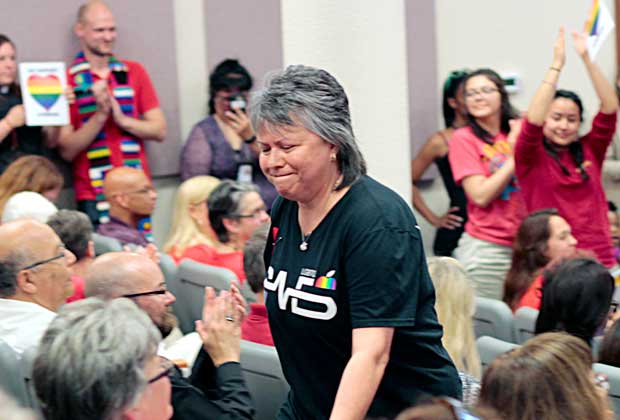LGBT advocates accuse Lt. Gov. Patrick of political grandstanding in his opposition to FWISD polcy

FWISD educator Sharon Herrera said trans guidelines will make a positive impact on students’ lives. (Tammye Nash/Dallas Voice)
Tammye Nash | Managing Editor
FORT WORTH — Fort Worth Independent School District became the latest battleground in the bathroom wars on Tuesday, May 10, when Lt. Gov. Dan Patrick came to town demanding that FWISD Superintendent Kent Scribner resign after signing guidelines detailing how the district and its faculty and staff are to interact with transgender students.
Patrick first issued a statement on Monday calling for Scribner’s resignation, and repeated the demand Tuesday at a 5 p.m. press conference at the FWISD administration building, just minutes before the school board’s regular meeting.
But those who support Scribner and the guidelines were there waiting for the lieutenant governor, eager to suggest to Patrick that he return to Austin and stay out of a local issue. Former Fort Worth City Councilman Joel Burns, who made national headlines in October 2010 with his impassioned speech during a council meeting on anti-LGBT bullying and teen suicide, and Equality Texas board Chair Steve Rudner pre-empted Patrick by holding a press conference in front of the administration building shortly after 4 p.m.
Scribner, at the board’s April 26 meeting, presented a set of guidelines he had authorized to detail the processes for implementing those parts of the anti-bullying policy approved by the school board in 2011 that deal with transgender students. The guidelines did not require a vote by the board and met with little fanfare — until anti-LGBT elements, including Patrick, found out about them.
Although nothing regarding the guidelines was listed on the board’s agenda for Tuesday night as an action item, hundreds of supporters and opponents turned up for the public comment section of the meeting to make their opinions heard.
Burns, reading from a prepared statement during the 4 p.m. press conference Tuesday, said he was “stunned … to read about Lt. Gov. Patrick’s fake outrage” over FWISD’s anti-bullying policy and the guidelines on implementing it.
“The lieutenant governor is not coming to Fort Worth to resolve any problems, he’s coming here to cause them,” Burns declared. “Dan Patrick … is out of bounds thinking he has any standing here today. He is intentionally picking a fight at the expense of Fort Worth kids and their parents and their teachers. He sees personal political gain in trying to tear us apart.”
“A bully like Dan Patrick can’t go unchallenged,” Burns continued. “He is wrong. He’s here to do harm for his own political gain.”
Rudner said Patrick needed to “get out of people’s bathrooms and get out of the school’s business. … Picking on children is a new low for our lieutenant governor.” Repealing the guidelines would violate federal law and would be “dangerous and economically risky” for the district and the city, he said.
“The courts have ruled and the law is clear,” Rudner said, referring to a recent decision by the 4th Circuit Court of Appeals declaring that Title IX protects against anti-LGBT discrimination (see Page 16). Stressing that the district policy in question was approved by the school board after extensive public input some five years ago, Rudner said, “There’s no news here except that the lieutenant governor has decided to pick on kids that is already a bullied group of kids. It is shameful and it is despicable.”
Where supporters of the guidelines noted that FWISD stood to lose more than $50 million in federal funds without rules protecting transgender students, Patrick noted that the state of Texas gives the district more than $340 million. And that gives him, as the state’s lieutenant governor, “a say” in FWISD’s business, he said.
Patrick insisted that the guidelines violate the Texas Education Code and state law by keeping parents out of the loop regarding their children’s behavior and activities. He also suggested that interpretations of federal law saying that Title IX includes protections based on gender identity and sexual orientation are “just a fantasy.”
Patrick said that only about 1 percent of FWISD’s students are possibly transgender, and suggested that such a small number does not justify the protections outlined the in the guidelines.
The guidelines, he said, “are putting the privacy and comfort of 78,000 students behind the comfort of that 1 percent,” and he criticized Scribner and the board for indulging in “social engineering” instead of focusing on improving performance in the 40 percent of the district’s schools that he said are failing.
Patrick went on to tout his “very strong credentials” on educational issues before saying that the FWISD guidelines would prompt lawsuits by outraged parents and would be overturned in the courts, and that the guidelines were “the biggest promotion for school choice,” one of his pet issues.
He said the guidelines — which he repeatedly referred to as a policy — go “against common sense,” violate state Board of Education rules. … This policy is poorly written, and poorly though out. This is not what a superintendent’s job is about.”
The dueling press conferences that preceded the board meeting were just the warm up. Advocates on both sides of the issue packed the boardroom for the public comment section of the meeting. An estimated 18 individuals took to the twin podiums over the course of a little more than an hour to speak either for or against the guidelines.
The crowd inside the board room — there were many more standing in the foyer or in the overflow room — seemed to be weighted a little heavier on the side of support, and an unofficial count puts the number of supporters who spoke at 20, compared to 18 who opposed the guidelines.
Many more had signed up to speak, but board President Jacinto Ramos Jr. said at the outset that the public comment session would be limited to one hour. He also said, however, that people were welcome to attend the board’s next meeting on May 24, and that individual board members might choose to hold forums on the topic in their districts.
Sharon Herrera, the FWISD educator who founded LGBTQ S.A.V.E.S., a support group for LGBT youth, was one of those who spoke during the meeting, talking about her own experience as a lesbian teen and how she attempted suicide at age 16. On Wednesday, she said she is encouraged by what she sees as the board’s support of Scribner and the guidelines.
“These policies have been in place since 2011. I worked with Fairness Fort Worth’s former president, Tom Anable, and current President David Henderson and Jon Nelson on those policies,” Herrera said. “This superintendent made those policies come to life to ensure that all students are safe on our campuses. Dr. Scribner made an impact on students’ lives.”
As for those who spoke against the superintendent and the guidelines, Herrera said, “My question to them would be, do you actually have children in Fort Worth ISD? Have you taken the time to listen to LGBTQ youth? Have you researched the facts of LGBTQ youth?”
And as for the lieutenant governor, “Dan Patrick is a bully,” the educator declared. “Does he not realize the danger he’s putting our youth in? I ask him, what do you tell the two trans students I currently have in the hospitals for attempting suicide?”
Henderson said Wednesday that he was “still processing” Tuesday’s meeting. But he had a message for Patrick, and for Texas Attorney General Ken Paxton, who has in the last week issued statements opposing the 4th Circuit Court of Appeals ruling and opposing FWISD’s guidelines:
“Please spend your time and money fixing what you broke, rather than breaking what Fort Worth fixed.”
…………………………..
Dan Patrick’s record on education
Texas Lt. Gov. Dan Patrick, in Fort Worth on Tuesday, May 10 for a press conference calling for Fort Worth ISD Superintendent Kent Scribner to resign over the district’s guidelines for interacting with trans students, repeatedly stressed his “strong credentials” on education during his years in the Texas Legislature.
But others have a far less rosy view of his record on the issue.
Patrick’s campaign website says he has a “proven record of defending our schools against the threat of CSCOPE and Common Core,” and stresses his support of “school choice” and charter schools. During his two terms in the Texas Senate, he was chair of the Committee on Education, and served on the Committee on Finance, for which he sat on the Subcommittee on Public Education Funding and the Subcommittee on Higher Education Funding.
According to various public sources, in February 2011, as vice chair of the Senate Committee on Education, Patrick spoke in favor of cutting an unspecified number of non-teaching positions from the state’s public school districts, such as “math department supervisors” and “curriculum experts.” In doing so, he claimed that Texas’ more than 1,200 public school districts — taken as a group — are the fifth-largest employer in the world. PolitiFact.com has called that claim “misleading.”
Patrick is also on record as being determined to establish creationism within the public school curriculum in Texas, despite court rulings that such a policy would violate the First Amendment to the United States Constitution.
As a senator, Patrick in 2011 voted in favor of massive funding cuts to education, and although he claimed on the campaign trail to have “led the charge” to restore some of that funding in 2013, he was actually was one of four senators who voted against it.
In his second term in the Senate in 2013, Patrick chaired the Senate Education Committee. Texas Monthly, which regularly rates Texas lawmakers, said Patrick was one of the worst legislators that session and called him, in his role as committee chair, a bully and an ideologue.
According to EducateForTexas.com, the University of Mary Hardin Baylor in 2014 conducted a study, “Texas Kids Can’t Wait,” and determined that then-Sen. Patrick’s voting record on public education issues was the worst in either chamber of the legislature in 2013.
And just this week, in his Grading Texas blog on the Texas State Teacher’s Association website, Clay Robison called Patrick “a schoolyard bully” and a “super-charged ideologue with an ego to match.”
This article appeared in the Dallas Voice print edition May 13, 2016.











